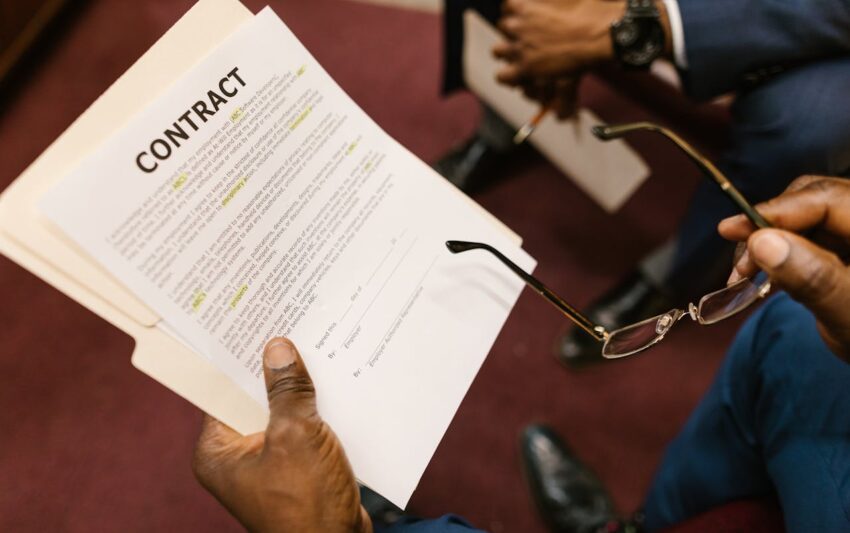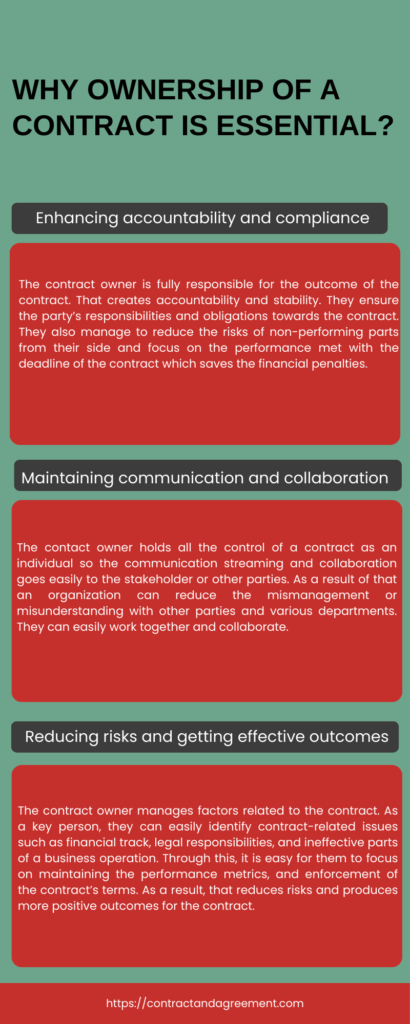
Introduction
To make a legally valid contract, at least one owner must be required. Therefore before entering into the contract, you should know the concept of contract ownership in a proper way. In this article, we explore what contract ownership is, its definition, different types of contracts, the advantages and disadvantages of contract ownership, and how you can choose a better contract for yourself. So, please stay tuned and read below:
Who is a contract owner?
A contract owner is a responsible person who overlooks the contract of an organization within the contract’s period. The role of the contract owner is essential during the contract cycle. He manages all aspects of the contract such as execution, ensuring the terms and conditions are met with the goals of an organization, etc.
The contract owner acts as a key person who manages internal and external sharers affairs, communications with other parties, making negotiations, etc. They are also responsible for managing risks and obligations that are met according to the terms of a contract. They manage the legal, financial, and operations in favor of an organization’s aspects. They are also closely involved in fulfilling the contractual relationship with customers, employees, business partners, and other parties.
What is contract ownership?
Contract ownership is the legal right of the contracting party involved who gets possession and control over the contract. Here, the contracting party may as an individual or organization, but this cannot affect the legal right of ownership of a contract. The contract owner has a fully legal right to enforce such contract’s terms and get benefits that are entitled under the contract. The terms of ownership of the contract are crucial in the business world because this determines the identity that possesses the control and power to enforce the contract terms.
But, in some cases, the owner of a contract does not party to the contract to get benefits directly. Such as in a contract with a corporation, here the corporation owns a contract, but the contract person is entered by the executive or one employee.
- The concept of contract ownership refers to the party’s right to receive a benefit from the performance of a contract. Let’s understand with an example, suppose Company A makes a contract with Company B to provide a certain type of goods or services, here in this case company A refers as a contract owner.
- Contract ownership plays a significant role in determining the holding power of the legal right of performance. The contract owner is also entitled to file litigation or sue in the case of breach of contract by another party.
- If the contracting party enters into a contract as venture partners, in that case, they can hold multiple ownership according to their share in the business venture.
- The contract of ownership can be transferred from one owner to another, suppose, if company A sells out its business to Company B, then any existing contracts of Company A become the assets of Company B.
There are many types of contracts available, every contract has different rules and regulations related to the ownership of the contract. Organizations can choose which contract is perfect for achieving their business goals.
Let’s see some examples to better understand this concept; the real estate contracts are basically owned by the party who holds the title of the property. Employment contracts are held by an employer, here the employee has some right to claim for damages if they are wrongly terminated. In the case of an insurance contract, the policyholder owns the ownership of the contract. But, in the case of a life insurance policy, there are exceptions because it may hold with the name of the beneficiary and they will pay out after the death of the policyholder.
Responsibilities of the contract owner
A contract owner is the center person of a contract. Their responsibilities towards the contract are the base of making a success of every contract. They take all kinds of positive steps to the fulfillment of the contracts and meet the goals of the organization’s purpose. They collaborate with all departments and stakeholders to ensure the agreement’s efficiency and compliance.
Monetary Comprises and performance
Monitoring compliance and performance of the contract is a significant factor in the success of a contract. The contract owner is fully responsible for managing and maintaining the contract terms to ensure the achievement of the organization’s goals. The contract owner needs to regularly review the contract term including according to the performance matrix, timeline, and all other factors that are within the contract.
Coordination with stakeholder
The contract owner manages the communication with all internal and external departments of an organization. They clarify the role of each party involved in the contract. Resolved complications and keep all updates to the stakeholders related to developments of the contract.
Risk management
The contract owner has to identify what are the risk factors of an organization and apply a proper strategy to manage them. In risk management, they include monitoring the terms that are met with the goals of an organization and financial risks.
Renewal and termination
The contract owner is involved in the key operations of an organization. They identify all terms and conditions needed to aspects with organization. If any terms and conditions do not with those goals which the parties are committed to. Then the contract owner observes and ensures whether the contract is renewed or negotiated. If the contract conditions do not match with the goal of an organization they can terminate such contract.
Why ownership of a contract is essential?
Contract ownership is a significant part of making the effectiveness of a contract. As an owner of a contract, they are fully responsible for controlling all aspects of a contract with the targeted goals of an organization. They involve various types of work to manage contract compliance, such as tracking milestones, reducing risk factors, resolving disputes between parties and stakeholders, etc. They handle other issues such as mismanagement, financial losses, or creating a legal battle.
Enhancing accountability and compliance
The contract owner is fully responsible for the outcome of the contract. That creates accountability and stability. They ensure the party’s responsibilities and obligations towards the contract. They also manage to reduce the risks of non-performing parts from their side and focus on the performance met with the deadline of the contract which saves the financial penalties.
Maintaining communication and collaboration
The contact owner holds all the control of a contract as an individual so the communication streaming and collaboration goes easily to the stakeholder or other parties. As a result of that an organization can reduce the mismanagement or misunderstanding with other parties and various departments. They can easily work together and collaborate.
Reducing risks and getting effective outcomes
The contract owner manages factors related to the contract. As a key person, they can easily identify contract-related issues such as financial track, legal responsibilities, and ineffective parts of a business operation. Through this, it is easy for them to focus on maintaining the performance metrics, and enforcement of the contract’s terms. As a result, that reduces risks and produces more positive outcomes for the contract.
Types of contracts
There are different types of contracts available for the fulfillment of the organization’s requirements. Some common types of contracts are listed below:
Express contract:
The express contract is a type of contract that is made expressly between the parties. There is missing a written or verbal agreement in such type of contract. Here in this contract, the contracting party stated via expression or openly. All the contract’s terms need to be met to make a legally binding contract. If for any reason those terms are not met, in that case such a contract may be voided.
Implied contract
Implied contracts are such types of contracts that are made by the parties through acts. This contract is not made expressly or verbally. But, that can be made either verbally or express, or both terms. Let’s understand with an example, if you went to a restaurant and ordered food, means you are a party to an implied contract. In that case, the restaurant agrees to serve food in the term of receiving money.
Verbal contract
As per the suggested name, these contracts are created verbally or spoken, there is no writing method applied to make this contract. Sometimes, this type of contract is very difficult to enforce, due to the lack of physical evidence. However, the contracting parties are stable upon the terms and conditions.
Written contract
This type of contract is made and signed by the parties in writing form. This type of contract provides more surety because all terms and conditions are set out by the parties in writing. The execution of this contract is not very complex, unlike a verbal, implied, or express contract. This type of contract can be taken into court in the case of breaches by the party.
What are the advantages and disadvantages of contract ownership?
We know that every contract has pros and cons. Contract ownership has also some advantages and disadvantages. Such as owning a contract can give you full control to manage the terms of an agreement. As a result, you can easily maintain all aspects of the contract and meet it according to the goals of an organization and make it a better deal. In contrast, it is not an easy task to own a contract, because that contains risks and responsibilities. If the contract owner fails to manage all terms and obligations it should result in financial losses and damages to an organization.
Conclusion
The contract ownership gives an individual or a company a legal right to manage and enforce the contract’s terms. The contract owner plays a significant role in meeting the fulfillment of all aspects and terms with the goals of an organization. That can be transferred when an organization sells out the business to the other party. In that case, the purchaser party becomes a contract owner. Contract ownership is a significant factor in business law, it enables the parties to enforce the contract terms, get benefits, and achieve the goals.





